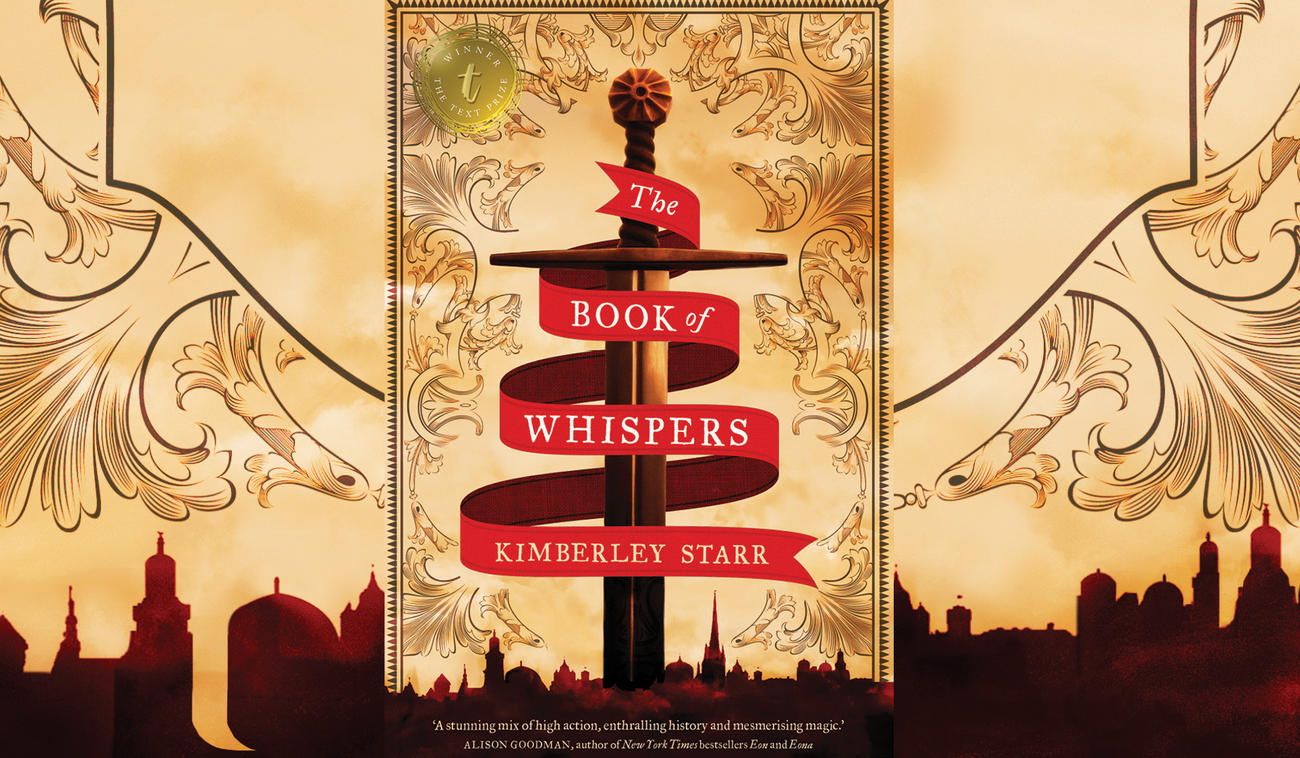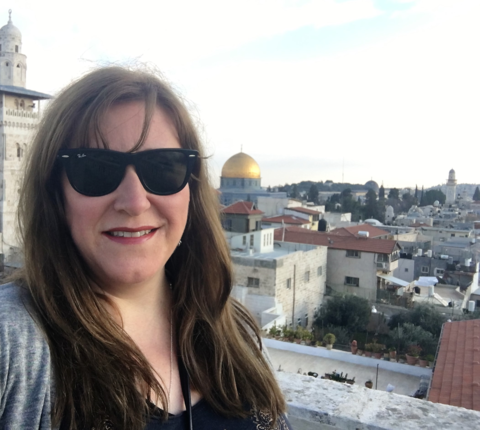
Kimberley Starr is the winner of the 2015 Text Prize for Young Adult and Chilren's Writing. Her mediaeval fantasy novel, The Book of Whispers, is a thrilling quest with a kick-ass female and male protagonist (dual narrative)—and set in the eleventh century during the Crusades. It’s energetic, lots of fun and a thoroughly satisfying read for readers aged fourteen and up. We chat to Kimberley about her writing process and how she managed to combine all her passions—history, fantasy and romance—into one book.
The Book of Whispers won the 2015 Text Prize for Young Adult and Children’s Writing. How did you react when you realised you’d won?
It was very exciting! I had entered before, with an earlier version of this manuscript, that didn’t make the shortlist. But I had to show my excitement in a subdued way, because the news that I’d won came to me in a telephone call I received while staying back at work one evening. I was also told that I couldn’t tell anyone! So I only told the people who had to wipe me up off the floor. And my family.
What was the process like from winning the prize to publication?
Arduous. The manuscript I entered into the Text Prize was the first half of a projected two-book set. Originally, The Book of Whispers followed my two protagonists, Luca and Suzan, only halfway through the crusade to Jerusalem. Another part of that exciting phone call involved my editor suggesting that my story might work better as a single book. Fortunately, that was the way I was leaning myself, so that phone call was the start of a productive relationship.
Productive and yet arduous, because the first thing I had to do was write the second half of the book. To give you some idea of the timeline, I wrote the first half of The Book of Whispers over four years, and the second half over about four months. It is to my editor’s huge credit that all the material came smoothly together into the unified book that now exists. We worked very, very hard going over all that material in more editing rounds than I like to think about—and I’m very proud of the result.
Your protagonist, Luca, and his father embark on a pilgrimage which we now know as the Crusades. What compelled you to write about this time period?
Well, the Crusades are of more than historical interest right now, given the situation in Syria and that some people refer to the current Middle East war ‘crusades’. The Book of Whispers is set during a historical period that has real symbolic significance for those who are interested in contemporary events. It’s a period of history that people should be interested in.
In the author’s note at the back of this book I talk about The Book of Whispers as ‘augmented history’ (which I’ll admit is an expression I thought of while watching students playing Pokemon GO, which is described as augmented reality. It’s reality plus monsters, while my story is history plus demons!). I wanted to tell a story that made history as interesting as I have always found it by telling it in a way that had characters kids could relate to and with a compelling narrative that made them keep asking what happens next.
Research required dipping into a lot of books, which was good for me because I love to read!
‘A stunning mix of high action, enthralling history and mesmerising magic.’ Alison Goodman, NYT bestselling author of Eon and Eona
You travelled extensively while writing The Book of Whispers—how did that experience shape the book?
Setting is very important to my writing because of the sensory details that I can only understand and describe properly if I’ve been somewhere. The idea for The Book of Whispers first came to me while I was travelling through Turkey in 2011. Locations I found there included the rock-convent where my character Suzan grows up as the daughter of a nun who wasn’t supposed to have children. I needed to have been there to appreciate the spookiness of the landscape, which has these incredibly strange but natural rock foundations that are sometimes called fairy towers and, other times, the Devil’s chimneys. It’s an evocative name as well as a place!
I’d already been to Italy, which is where my other main character, Luca, grows up in a villa where he is haunted by demons that only he can see. And late last year I realised I could only write about Jerusalem authentically if I went there as well, so I visited in December 2015. A lot has changed in a thousand years but while I was there, I realised that a lot has remained the same. It was those similarities that I really wanted to bring out.

The rooftops of the old city in Jerusalem
The Old City, where I stayed in an old convent on the Via Dolorosa, is essentially a mediaeval fortified town. Staying there in the twenty-first century, you might pass groups of people making pilgrimages, just as they did in the Middle Ages. When I left my accommodation I’d find myself weaving through groups of pilgrims wearing modern clothes—jeans, heavy jackets (it was winter) and carrying a huge cross, as they have been doing for centuries.
I imagined Jerusalem in the era I was writing about, where the city was laid out more or less as it is now, along very narrow cobblestone streets.
The Book of Whispers blends historical fiction with fantasy. How do you feel one enhances the other?
This is something I wonder about a lot as a student (as well as a teacher) of both literature and history. The best understanding we can come to about the past is through trying to recreate it in stories. In fact, it seems to me that everything we think we know about other eras takes the form of stories. And there are many, many stories about the Crusades.
Radio shock-jocks arguing about Syria are attempting to rewrite the Crusades, but the Crusades have been written and rewritten ever since they happened. Researching my story, I read narratives written by actual crusading knights, and also by men and women living in the countries these knights passed through and attacked. In reading these accounts, as in reading anything historical, it seems to me that we each have our own story. And one role of story is to make sense of our lives.
Luca and Suzan’s story could only make sense in a world that had demons in it. In my early drafts, they were more ‘idea demons’*. I thought that Luca would believe in them but readers could be open-minded about whether they existed or not. In The Book of Whispers the demons are very, very real and have horrific purposes of their own.
*Read Kimberley's blog post on writing demons
You are an English teacher by day—in what way, if any, have your students influenced your writing?
As a teacher as well as a writer, I spend a lot of time thinking about how to get teenagers reading. I’ve recently heard that today’s teenagers actually read more words than ever before. But many read these words in Facebook posts and SMS messages and skimmed Wikipedia articles. They’ve been online since they were toddlers. They read pieces of stories from everywhere and from nowhere. We can do better than that. I want them to read sustained narrative…in books.
So, I asked some of my Year 8 students what it is that they like about books they read, and what keeps them involved in stories. All said they like suspense. I asked, ‘Do you mean, heart-pounding adventure?’ and they rolled their eyes.
These kids are clever. They don’t want clichés. They want stories that are interesting and vivid and original. And they want suspense.
They also want romance. I love how honest they are. A couple of boys admitted they like reading about romance as long as it isn’t the entire cover. ‘What if it’s a knight and a girl he rescues?’ I asked. My female students had something to say about that. They said, ‘As long as she rescues him back.’
How do you write well for a teenage audience?
I think the thing is to respect teenage readers. They’re a very sophisticated audience and it would be wrong to talk down to them. I’m a teacher because I really value the company of teenagers. I like to think—and hope!—I can entertain and intrigue them with my story.
What are you working on now?
It’s been such a huge year for me that I haven’t really had a chance to settle into anything new yet. So I have a few projects at the start of being on the go. The one I have developed the furthest is a time travel story, so it still has significant fantasy elements. And I have a literary novel I’ve been working on in bits and pieces for too long. And I still have plenty of ideas about what might happen to Luca and Suzan now, after The Book of Whispers. So, who knows? All I can say is, watch this space. And watch my blog, at www.kimberleystarr.com.



